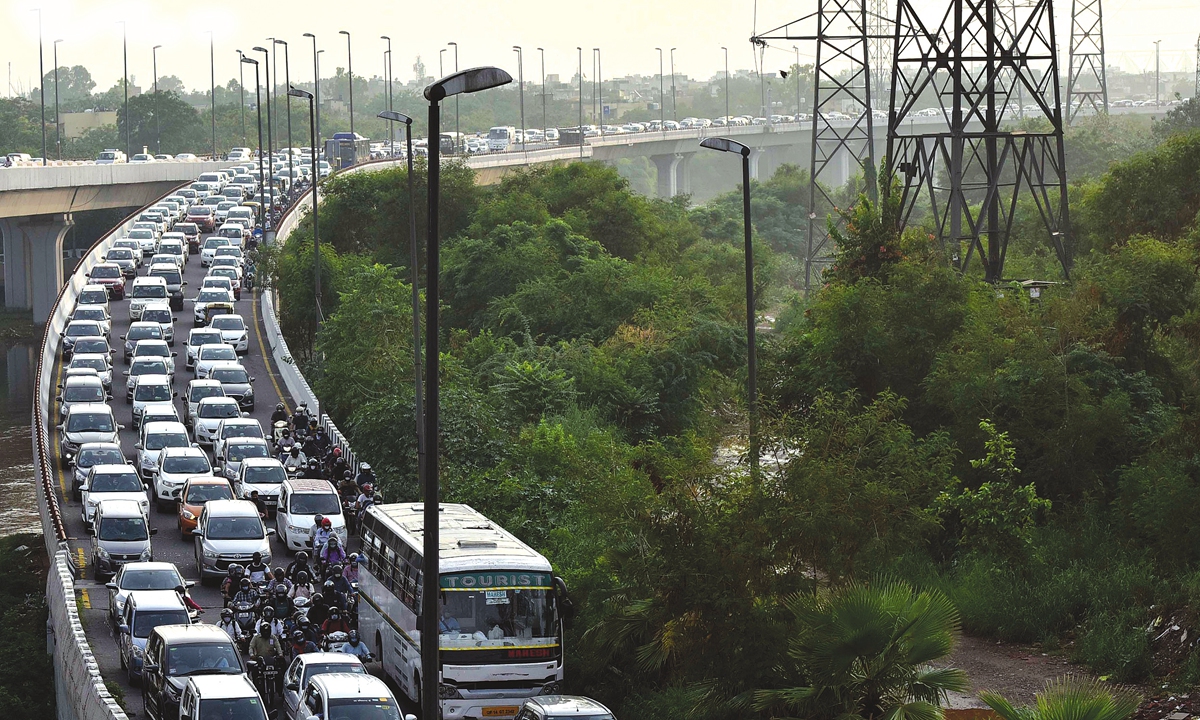Will India get on the SCRI bus for long?
Source: Global Times Published: 2020/8/20 22:16:54

Due to a heavy rainfall , there are traffic jams on some road sections in Gurgaon, the satellite city of the Indian capital Delhi, on July 21. Photo: VCG
India, Japan and Australia have begun discussions on launching a trilateral Supply Chain Resilience Initiative (SCRI), with the aim of reducing dependency on China's manufacturing sector, The Economic Times reported on Wednesday.While it seems justified for countries to cooperate on supply chain recovery for the post-coronavirus period, it doesn't obscure the geopolitical thinking behind the plan.
Generally speaking, the China-centered Asia value chain is expected to be at the heart of global economic recovery. Yet, instead of turning to China - the first major economy to show a recovery from the coronavirus pandemic - the initiative appears to make a detour by pinning its hopes on India, which is still far from bringing the pandemic under control.
Given its strained relationship with China, Australia may hope India could step up under the supply chain alliance to replace China's role in its economy. Such a vision is understandable as many believe India has the same demographic dividend as China had decades ago.
Yet, it is questionable whether or not India can really undertake such an important role as to counter the so-called China supply-chain dominance.
While it is true that the Modi government has made various efforts and attempts to promote industrialization in the country over the years, there is also no denying its manufacturing bottlenecks are unlikely to be addressed in the short term.
Moreover, with the world's third highest tally of coronavirus cases, the Indian economy is taking its worst hit for decades. The impact is so serious that it may hinder the resumption of the manufacturing industry in the country. If India's own industrial foundation doesn't meet requirements for establishing an industrial chain in the pre-pandemic days, it will certainly become harder for it to do so post-pandemic.
What's more, any international supply chain cooperation calls for an open trade environment - exactly the thing India is unsuited to adapt itself to. For a long time, the Indian economy has been awkward in the globalized trade system. The Comprehensive and Progressive Agreement for Trans-Pacific Partnership, also known as TPP-11, did not invite India, and the Regional Comprehensive Economic Partnership (RCEP) is expected to be signed without India. It is not because India is not interested in participating in the global value chain through various regional trade arrangements, but because it is reluctant to open its market to the outside world. For the Indian government, supporting domestic industries has always been prioritized over luring foreign investment.
As such, India is unlikely to play a big role in reviving the regional supply chain. Compared with India, the ASEAN is more flexible and open in its trade practices, and therefore may be more suitable to become the world's next manufacturing hub.
There is no denying that industrial cooperation is important in the world of rising protectionism, but it is still regrettable to see a geopolitical shadow behind it.
Posted in: GT VOICE